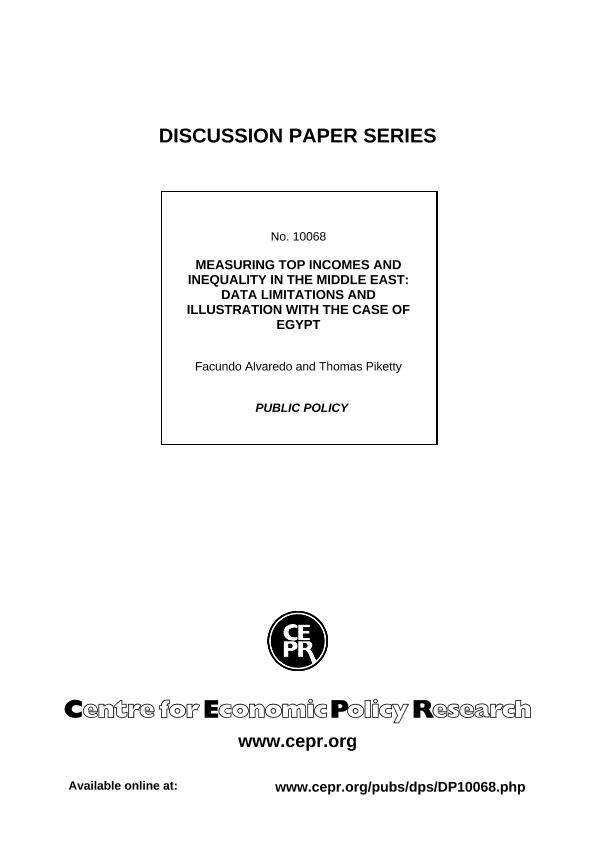Artículo
Measuring Top Incomes and Inequality in the Middle East: Data Limitations and Illustration with the Case of Egypt
Fecha de publicación:
07/2014
Editorial:
CEPR
Revista:
CEPR Discussion Paper Series
ISSN:
0265-8003
Idioma:
Inglés
Tipo de recurso:
Artículo publicado
Clasificación temática:
Resumen
This paper discusses the data limitations associated with the measurement of top incomes and inequality in the Middle East, with special emphasis to the case of Egypt. It has been noted that high inequality might have contributed to the Arab spring revolt movement. Some studies have argued however that measured inequality in Middle East countries is not particularly large by international standards, and that popular discontent mostly reflects the perceived level of inequality, and the perceived (un)fairness of the distribution. In this paper we review the evidence and present new estimates. We come with two main conclusions. First, data sources at the national level are insufficient to derive reliable estimates of top income shares in a country like Egypt(or in other Middle East countries). One would need reliable fiscal sources in order to make a precise comparison with other emerging or developed countries. Unfortunately, such sources are lacking in most of the region. Next, and irrespective of these uncertainties on within-country inequalities, there is no doubt that income inequality is extremely large at the level of the Middle East taken as whole-simply because regional inequality in per capita GNP is particularly large. According to our benchmark estimates, the share of total Middle East income accruing to the top 10% income receivers is currently 55% (vs. 48% in the United States, 36% in Western Europe, and 54% in South Africa). Under plausible assumptions, the top 10% income share could be well over 60%, and the top 1% share might exceed 25% (vs. 20% in the United States, 11% in Western Europe, and 17% in South Africa). Popular discontent might reflect the fact that perceptions about inequality and the (un)fairness of the distribution are determined by regional (and/or global) inequality, and not only on national inequality.
Palabras clave:
Egypt
,
Inequality
,
Middle East
,
Top Incomes
Archivos asociados
Licencia
Identificadores
Colecciones
Articulos(SEDE CENTRAL)
Articulos de SEDE CENTRAL
Articulos de SEDE CENTRAL
Citación
Gonzalez Alvaredo, Facundo; Piketty, Thomas ; Measuring Top Incomes and Inequality in the Middle East: Data Limitations and Illustration with the Case of Egypt; CEPR; CEPR Discussion Paper Series; 7-2014; 1-60
Compartir




